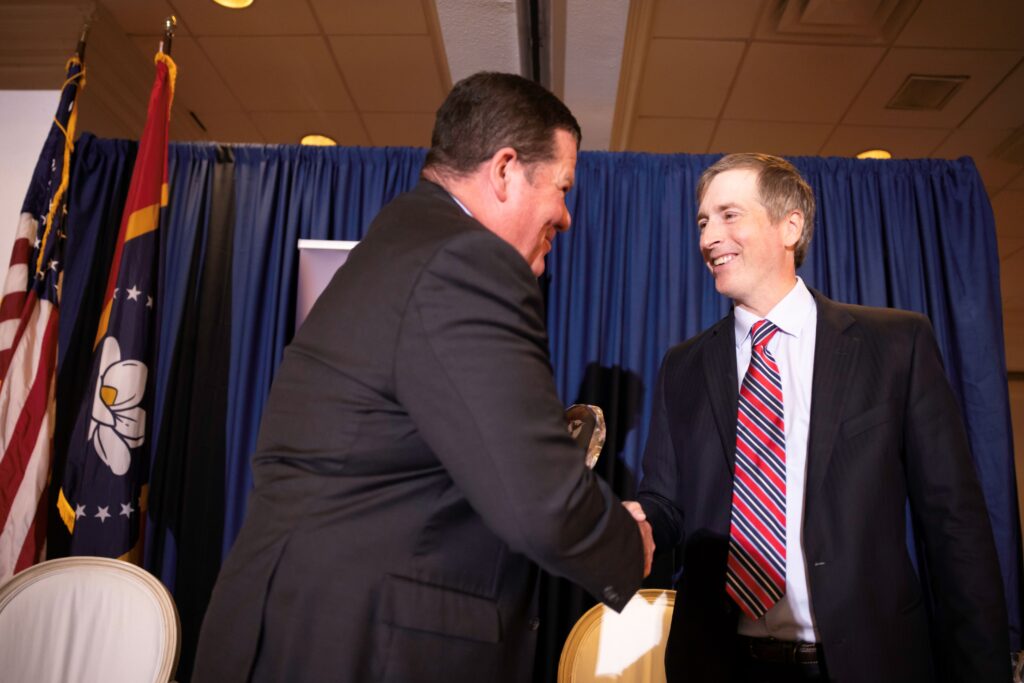A small win for freedom in Mississippi! Governor Tate Reeves recently signed HB3, a law that reforms the state’s Certificate of Need (CON) rules.
CON is basically a government approval process healthcare providers (like hospitals) must go through before they can add certain services, build new facilities, buy expensive equipment, or make big expansions.
HB3 makes some modest changes, allowing more flexibility for some specific providers. It also raises the dollar threshold for capital spending requiring approval.
Perhaps the most significant part of the bill is that it mandates the Mississippi Department of Health to do a study over the course of this year into the feasibility of letting smaller hospitals skip CON when providing kidney dialysis treatment and adult psychiatric services.
While HB3 does not give us the reforms Mississippi needs, it is a step in the right direction. In a legislative session that has seen most significant reforms killed in the Senate, this is one rare example of a free market reform in the 2026 session.
As we kick off 2026, the Mississippi Center for Public Policy is more energized than ever. We are excited about the successes our state has seen – and we have a plan to build on that momentum with further free market reform!
For decades, our state lagged behind. Growth was slow and too many young people left our state to seek opportunities elsewhere. That is starting to change.
Over the past five years, Mississippi has seen more economic growth than in the previous 15 combined.
Mississippi’s progress is real, but it did not happen by chance. It is happening thanks to free market reform - including major tax cuts, flexible labor laws, affordable energy, and fiscal discipline.
MCPP aims to help build on this in the 2026 legislative session. We have a clear, targeted plan for further free market reforms. Here is our focus for the 2026 legislative session which starts this coming week:
- School Choice
Mississippi has already taken a strong step by assigning every public-school student a personalized education budget. Now is the time to let families truly control it. We are working to see a universal Education Savings Account (ESA) program, modeled on successful reforms like Arkansas’s LEARNS Act.
Other education reforms, such as making it easier for families to move from one public school to another are important, but the key goal must be an ESA system, just like they now have in Arkansas, Tennessee and Alabama.
- Repeal of Certificate-of-Need (CON) Laws
Mississippi’s outdated health regulation regime stifles competition, blocks investment in healthcare and drives up costs - especially in rural areas. We are pushing for a partial repeal of these restrictions across regulated services.
It is also essential that we grant Advanced Practice Registered Nurses full practice authority. These changes could lower healthcare costs significantly, expand rural access, and save millions annually - freeing the market to deliver better, more affordable care.
- Conservative Spending
To enable future tax cuts, and to prevent the public sector crowding out local businesses, we need to see fiscal discipline in this state. The fiscal climate is changing, and the days of large federal subsidies is coming to an end. It is essential that our lawmakers live within our means. That means keeping spending under control and not squandering any surpluses.
These are MCPP’s big three priorities for the coming session – and we will be working closely with key lawmakers and our coalition allies to advance them.
MCPP is also supportive of a number of other reforms up for discussion. For example, we would love to see a restoration of the ballot initiative. With labor-force participation in Mississippi still too low, we would love to see reform in welfare administration to ensure more stringent requirements on able-bodied welfare recipients, and more meaningful sanctions for non-compliance. We would support such changes, but they are not our primary focus for this session.
We are super excited at the start of the 2026 legislative session. Our team will be working hard to ensure real reform – and I will be sure to keep you personally updated on the progress we make as the session advances!
For decades, Mississippi has been the punchline in national discussions about economic performance - often ranked at the bottom in income, education, and opportunity.
But something remarkable has happened in recent years: the Magnolia State is undergoing a genuine resurgence, driven not by federal handouts or gimmicks, but by principled free-market reforms.
A major national publication, the Washington Examiner, recently spotlighted this transformation in a feature titled "Mississippi Turning." The article notes that Mississippi has achieved more economic growth in the past five years than in the previous 15 combined.
This isn't hyperbole; recent data from the Bureau of Economic Analysis shows Mississippi posting some of the nation's strongest GDP growth rates, including a 4.2% real GDP increase in 2024 that ranked second nationally.
What’s fueling this engine? Bold structural changes that prioritize freedom, competition, and low barriers to opportunity.
First, labor-market reforms have opened doors for workers and entrepreneurs. In 2021, Mississippi enacted universal recognition of out-of-state occupational licenses, allowing skilled professionals to bring their talents here without jumping through needless bureaucratic hoops. The state has also slashed red tape on in-state licensing requirements, eliminating hundreds of hours of mandatory training for many everyday jobs. These changes have attracted talent, put downward pressure on remaining barriers, and made it easier for Mississippians to earn a living.
Second, historic tax reform is putting money back in people's pockets. Starting with the largest tax cut in state history in 2022, Mississippi phased in a flat 4% income tax. In 2025, lawmakers went further, enacting legislation to reduce the rate to 3% by 2030 and trigger annual cuts thereafter until the state income tax is fully eliminated—the first such move by a state in decades. This pro-growth policy rewards work and ambition while making Mississippi more competitive for businesses and families.
Third, a commitment to reliable, low-cost energy has made the state a magnet for investment. By resisting costly subsidized green mandates, Mississippi has kept electricity prices among the nation's lowest, powering energy-intensive industries like data centers and advanced manufacturing. Major announcements, including billions from companies like Amazon Web Services, underscore how affordable energy translates into jobs and capital inflows. Since 2020, the state has attracted tens of billions in private investment, fueling record-breaking economic development.The results speak for themselves: explosive GDP growth, surging personal incomes, rising university enrollments, and—for the first time in generations—net in-migration as people choose to move to Mississippi rather than away. Recent years have seen positive net migration, reversing long-standing outflows and signaling a brighter future.
This turnaround didn't happen by accident. It's the direct consequence of free-market ideas championed by policymakers and advocates who refused to accept the status quo. Mississippi is no longer just catching up; it's becoming a national model that other states are watching closely.
As we close out another productive year, moments like the Washington Examiner's recognition remind us that principled, steady work pays off. Mississippi is proving that freedom works—creating a freer, more prosperous place for all its citizens. Other states should take note: lower taxes, fewer regulations, and reliable energy are the path to revival.
Click here to read the Washington Examiner article.
FOR IMMEDIATE RELEASE
October 30, 2025
MISSISSIPPI CENTER FOR PUBLIC POLICY HONORS LEGISLATIVE HEROES AT ANNUAL GALA CELEBRATING STATE SUCCESS
JACKSON, MS – October 30, 2025 –Six of Mississippi’s leading lawmakers were presented with award to honor them for championing principled conservative policy. Rich Lowry, editor of the National Review, presented each of the winners.
Healthcare
Rep. Sam Creekmore and Rep. Hank Zuber were jointly honored for their leadership in challenging Mississippi’s Certificate of Need (CON) laws, which restrict the expansion of healthcare providers and limit patient access.

Countering DEI
Sen. Angela Hill received the award for her early and unwavering stand against the encroachment of divisive DEI (Diversity, Equity, and Inclusion) policies in Mississippi’s public universities. Long before the issue gained national attention, Sen. Hill worked to safeguard academic freedom and institutional integrity at the state’s flagship campuses.

Education Reform
Rep. Jansen Owen was recognized for leading the 2025 legislative effort to expand open enrollment through HB 1435. Though the bill passed the House with broad bipartisan support - uniting parents, educators, and lawmakers - it was ultimately blocked in the Senate.

Income Tax Elimination
Mississippi became the first state since Alaska in 1980 to phase out its personal income tax through HB1. Rep. Trey Lamar and Speaker Jason White were honored as the driving forces behind this transformative reform. Through public town halls, transparent negotiations, and superior policy arguments, the duo outmaneuvered opposition and delivered a pro-family, pro-growth tax cut that is already attracting investment and enhancing Mississippi’s competitiveness.“


These lawmakers represent the best of conservative leadership - courageous, principled, and effective,” said Douglas Carswell of the Mississippi Center for Public Policy. “Their work is making Mississippi a national model for freedom, opportunity, and common-sense governance.”
This week, I’ll be traveling to Washington, D.C. talking about Mississippi’s remarkable progress, including our elimination of the income tax and how we might best advance school choice in our state.
Mississippi is gaining national attention for our transformative public policies. Once seen as a perennial underdog, our state is now recognized as a leader in free-market reforms that are driving unprecedented economic growth. A lot of folks in Washington and elsewhere are starting to notice our state for the right reasons!
Over the past five years, under Governor Tate Reeves’ leadership, we’ve achieved more economic progress than in the previous fifteen years combined, attracting massive investment. The folk making the decisions to put their dollars into our state know success when they see it.
This week, the Mississippi Center for Public Policy was honored with an award for our role in eliminating the income tax—a milestone in a series of reforms, including labor market changes in 2021, flat tax implementation in 2022, and school funding reforms in 2023.
As I said in my speech when I accepted the award on behalf of our Mississippi team, together these reforms make a potent policy combination. Click on the image below to hear what I said to the audience about Mississippi’s success story.

Now, we’re focused on the next critical step: school choice. Momentum is building, and there’s strong support from Team Trump, who see it as “the civil rights issue of our time.”
This week, two senior Trump administration officials, Deputy Assistant Secretary Laurie Todd-Smith and Deputy Chief of Staff Lindsey Burke, visited Mississippi to advocate for education reform before the House Select Committee on Education Freedom. Their compelling case was met with enthusiasm from parents, who outnumbered the entrenched status-quo lobbyists.
Mississippi is on the cusp of ensuring every family has access to the educational opportunities their children deserve. Your support is vital as we work to make school choice a reality.
Thank you for standing with us.
Speaking to my friends at Smith County Republicans the other day, someone asked me what I most loved about moving to Mississippi from London.
There are so many things I love about the Magnolia state, the more I thought about it, the longer my answer grew. I thought I’d list a few of my favorite things about life in Mississippi.
1. Southern Civility. Yes, it’s a bit of a cliché, but as an outsider I can confirm it’s the truth; Mississippi folk are the friendliest people on the planet. Southern charm makes being here such a joy.
2. Mississippi BOOM! Since I arrived almost five years ago, economic output in the state is up about a third. There’s been a massive injection of inward investment. You can feel the growth. Coming from the other side of the Atlantic, it's uplifting to live in a place that is on the up.
3. Income tax on the way out. Mississippi is on the way to eliminating the income tax entirely, like Florida, Tennessee and Texas. It is great to live in a society where taxes go down and public officials can’t expect to keep taking more.
4. Space. With 3 million people spread out over 48,000 square miles, Mississippi has lots of space. There’s a great big outdoors. Our state might not have mega cities the size of Atlanta or Chicago, but having seen the boarded up offices and shops in Chicago, I wonder if modern technology means that being more spread out is actually the way to go.
5. Stunning small towns. Too often downtown America feels abandoned, people and businesses having moved to the suburbs. One of the delights Mississippi has to offer are towns that are actually prospering. Downtown Oxford, Starkville and Natchez, for example, are full of shops and restaurants – and thriving.
6. Universities. Our family is at the stage where we’re starting to think about college options. There are so many great choices in this part of the world. Sending your kid to a southern university reduces the chance they’ll become a communist – which is why, I suspect, we are seeing such a surge in applications from outsiders wanting to study in this state.
7. High school football. The football season is about to begin and when it does, the highlight of my week will be watching Friday night football. It is a festival of everything Americana…..
8. College football. The next best thing is college football. Sure, we don’t have an NFL team, but I genuinely prefer watching SEC teams play.
9. The weather. Some folk complain about Mississippi’s heat and humidity. Coming from London where one would sometimes seldom see the sun, I love the climate here. The sun in our state is up bright and early (almost) every day. Glorious.
10. Gardening. I love gardening, and it seems you can grow almost anything here. Sweet peas. Hibiscus. This year I’ve had a bumper crop of grapes and even starting to get some mulberries.
If living in America means you’ve won first prize in the lottery of life, being in Mississippi means you got the bonus ball!
Mississippi is shedding its image as an economic laggard. Over the past five years, the state’s economic output has grown more than it did over the previous fifteen years combined.
According to the U.S. Bureau of Economic Analysis, Mississippi posted the second-fastest per capita GDP growth and fifth-fastest personal income growth among all states in Q4 2024. Billions in capital investment have flowed in.
This growth is happening across the state—from the Gulf Coast and Pine Belt to DeSoto County, the Jackson metro area, and the university hubs of Oxford and Starkville.

Mississippi whoooooosh!
Mississippi’s recent growth is no accident. It is down to good public policy. Since 2022, Mississippi has implemented transformative tax cuts, reduced the state income tax and lowered the grocery sales tax and easing business inventory taxes. A 2021 law streamlining occupational licensing reduced barriers for workers and entrepreneurs, with the Mississippi Secretary of State reporting a 12% increase in new business registrations in 2023 alone.
Energy in our state is affordable, Mississippi electricity rates averaging 13.43 cents per kilowatt-Hour, helping draw in energy-intensive industries, including two major data centers in Madison and Rankin counties. To top it all, Mississippi’s public universities are fueling growth, and around Oxford and Starkville, entrepreneurial ecosystems are thriving.
But to maintain this momentum, our state needs to abandon policymaking as usual and embrace bold reform. That’s why the Mississippi Center for Public Policy (MCPP) has just launched The Mississippi Miracle? Bold Reforms for Growth.
Our paper details practical steps to sustain and accelerate this momentum:
- Empower Parents Through School Choice: Let families use state funds for public, private, or homeschooling options to drive competition and elevate education standards.
- Refocus Higher Education: Cut administrative bloat, prioritize workforce-relevant programs, and redirect resources from low-value courses to practical, job-focused education.
- Rein in Public Spending: Cap budget growth to population growth plus inflation to ensure fiscal discipline and curb waste.
- Cut Red Tape: Eliminate outdated regulations, repeal Certificate of Need laws, and create a business-friendly environment to spur innovation.
- Reform Public Procurement: Mandate transparent, competitive bidding with regular audits to prevent cronyism and maximize taxpayer value.
- Promote Welfare-to-Work: Emphasize work requirements, job training, and time-limited benefits to foster self-sufficiency and reduce program costs.
These reforms are practical policies that lawmakers can implement to improve lives across Mississippi.
To explore them in detail, visit mspolicy.org under “Publications” or email me at [email protected] for a direct link.
MCPP has a small, but highly productive team. We punch above our weight, producing policy proposals that become law, and helping set the agenda at the Capitol. We are able to do all this because we have the input of so many people across our state. Please read our proposals and share your thoughts—I want to hear what you think.
For decades, Mississippi exported people. Young people in particular tended to leave our state for places like Atlanta, Nashville, Huntsville and Austin.
I believe the tide is starting to turn. I often hear anecdotes of young people moving back to Mississippi. The data suggests that growth in our state is creating opportunities and drawing more people to move here .
Have a read of our report and help us build on this momentum.
Last week, Mississippi lawmakers finally stumbled into the 21st century and decided that adults—yes, grown-ups—should be allowed to buy wine online.
A round of applause for Senators Michel, Blackmon, England, and DeLano, who convinced their colleagues that Mississippians should be allowed to do something they do in almost every other state. Until now, if you wanted a bottle of wine, you had to head to the store and buy only what the Alcoholic Beverage Control board had approved.
But don’t uncork the champagne just yet. This bill only just squeaked through the Senate, with 21 so-called “conservative” senators clutching their pearls and trying to smother it in its crib. Why, you ask? What possible reason would any politician have to stop you buying wine online? I do wonder if anyone at the legislature was wined and dined - probably both - by lobbyists for wine distributors who'd rather not compete with online retailers. That it took years to pass something this basic should alarm every conservative in our state. That so many “conservatives” were ready to leap to the defense of various vested interests is depressing. How many lobbyist-funded dinners does it take to kill good conservative policy?
Right this minute there are still lots of great conservative bills alive in the 2025 legislature. But if it is this hard to let people buy Merlot online, what hope is there for the big stuff? School choice? Cutting red tape? Eliminating DEI? The good news is that right now there are still lots of great conservative bills alive in the 2025 legislature. Good conservative lawmakers could still achieve great conservative wins this session.
The House has a plan to eliminate the income tax — imagine keeping more of your own money; radical, I know. Having passed their bill HB 1, the House has decided to hold off passing any legislation from the Senate until the Senate actually does something to eliminate the income tax. Another excellent conservative proposal is HB1435, which would allow public to public school choice. Approved by the House, it is currently being considered by a committee in the Senate. It’s a similar story with HB 922, authored by the awesome Representatives Zuber and Creekmore. This bill would repeal a lot of the red tape that prevents new health care providers operating in our state.
Both the House and the Senate have approved different bills to combat DEI. Again, this is something every conservative should not hesitate to support. If our lawmakers were to complete the passage of these bills, it would be a vintage year for liberty in our state. But the danger is that these bills, like efforts to restore the ballot initiative, are quietly garroted in a back room at the Capitol.
For years, we have seen solid conservative policies get “killed in committee.” Don’t be fooled about what that means. When a bill “dies in committee,” it’s not a natural death. The committee chairman didn’t misplace it under a stack of memos — it was knifed, Julius Caesar-style. Only instead of togas, it’s cheap suits and lobbyist cash.
The next couple of weeks will be critical. As with the online wine bill, we could see good conservative lawmakers pass good conservative laws. If they do, they deserve a medal—or at least a decent glass of Cabernet. Or it could be that those Governor Tate Reeves calls “the Coalition of the Status Quo”, once again kill off the chance of change. I will be sure to keep you updated about the progress of each of these critical conservative policies, and let you know who supports them, and who, if anyone, fails to support them.
How much do you imagine it costs to send a child to public school in Hinds County every year? $5,000 per year? Maybe $10,000? $15,000?
Actually, according to data from the Mississippi Department of Education, when you divide the number of students attending school by the total expenditure, in 2023-24 Hinds County spent $16,589 per student.
That is more than twice the average private school fees in our state. Indeed, $16,589 is not far off what it would cost to send your child to a top private school.
Now ask yourself if each child in Hinds County is getting a top education for that $16,589? Of course not. A large chunk of the kids can’t read or do basic math. One in three of them regularly skip school.
So, why not give families in Hinds County the right to take a portion of that $16,589 and allocate it to a school of their choice?
It’s not just Hinds County. The same question could be asked in Madison ($17,037 spent for every public school pupil per year) or Rankin ($15,198 per pupil per year), or Canton ($18,683) or De Soto ($13,820).
Even if you take the Department of Education’s own more conservative figure for per pupil spending (which includes all the ‘no-show’ students), Mississippi still spends an average of $14,676 per student.
Despite all that money, 4 in 10 fourth graders in Mississippi public schools cannot read properly. Eight in 10 eighth grade kids in Mississippi were not proficient in math in 2022. One in 4 kids routinely skips school.
Nor has $14,676 per student spending translated into better teacher pay. Notwithstanding recent pay increases, our teachers still earn significantly less than they did in 2010, when you adjust for inflation.
If you happen to be one of the fortunate families happy with the public education options available, great. No need to change and no one is proposing any changes that will affect you. But why not allow those families unhappy how things are the freedom to take their tax dollars to a school that best meets their needs?
Suggesting this provokes outrage not from parents, but from various vested interests who like things the way they are. They like a system that puts the $14,676 they get for your child into their administration budget, rather than the classroom. School superintendents making more than the Governor want to keep control of their multimillion dollar budgets for a reason. It’s a boondoggle for bureaucrats.
School Choice will not impoverish public schools. The legislation that Speaker Jason White is proposing would allow families control over the state portion of funding, not locally raised revenues or federal dollars.
In Hinds County, for example, that would mean families being able to allocate no more than $6,700 of the $16,589 overall per pupil funding. (Rather than depleting Hinds County public schools’ budget, actually it would make Hinds County better off in terms of per pupil spend.)
Giving families control over $6,700 of the state funds will not mean a flood of kids coming into your well run school district. Why not? Because the legislation proposed specifically gives school boards the final say on capacity.
What anti School Choice campaigners really fear is not the “wrong” kids coming to your school. What they fear is that you start wondering what the heck they’ve been doing with the $14,676 they get for your child or grandchild every year.
All of the arguments we are now hearing against School Choice in Mississippi have been heard in each of the surrounding states that have since adopted School Choice.
Alabama’s new Educations Savings Account program, which has just opened for applications, has been wildly oversubscribed. The program provides $7,000 funding per student attending a participating private school, while those enrolled in home education programs are eligible for $2,000 per student.
Arkansas allows all K-12 students access to an Education Savings Account from 2025, into which the state government pays the state portion of per pupil funding ($6,600 per year). Families will be able to use this $6,600 money they are given to pay for their child education, including private school tuition. Arkansas also allows public to public school transfers, allowing districts to define capacity.
Louisiana’s GATOR program starts in 2025-26 and establishes an Education Savings Account for those on low incomes, with the details are still being finalized as the law only recently passed. Louisiana already has public to public School Choice.
Texas and Tennessee, too, are at this very moment debating legislation that would create a universal Education Savings Account for families in those states, too.
None of the scare stories we now hear in Mississippi materialised in any of these neighboring states. None of these states has been bankrupted like the critics claimed by letting mom and dad have parent power. Instead, all the evidence suggests School Choice has started to improve education outcomes.
